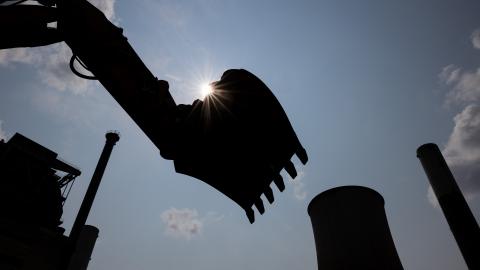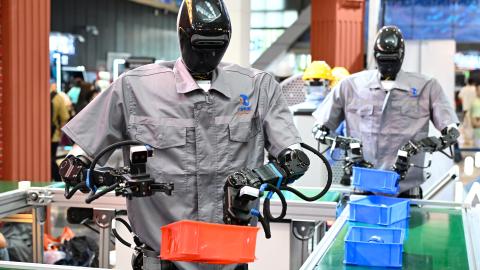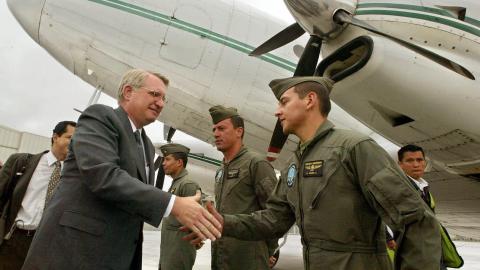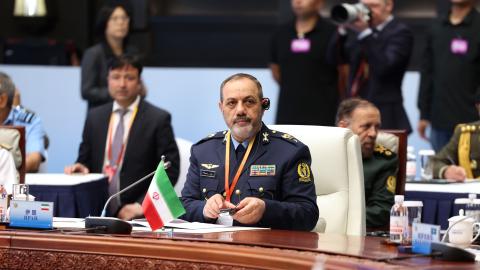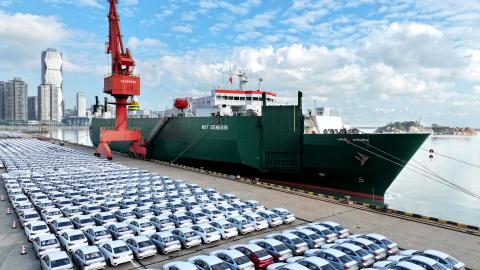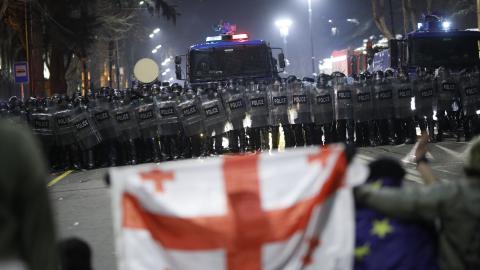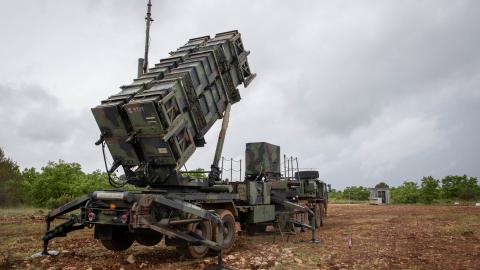
Industry, Security, and Community: Senator David McCormick on the Nippon Steel–U.S. Steel Deal

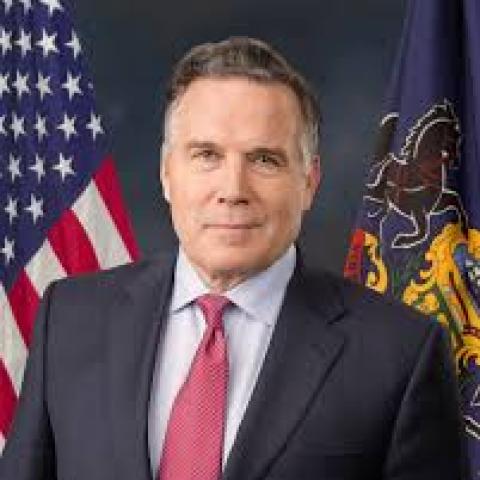
United States Senator, Pennsylvania
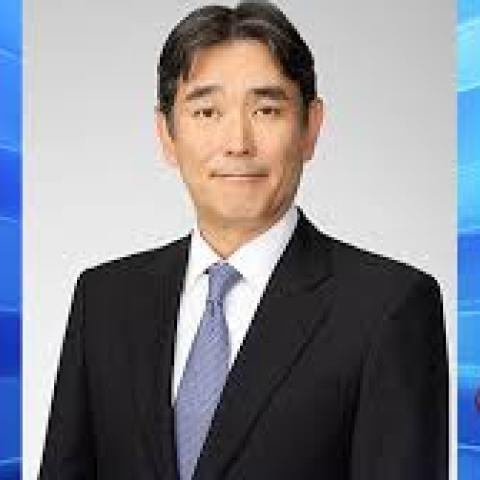
President and CEO, Nippon Steel North America

Chief Financial Officer, U.S. Steel

Chief Executive Officer, Allegheny Conference on Community Development

Executive Vice President
Joel Scanlon is executive vice president of Hudson Institute.

Senior Fellow and Deputy Director, Japan Chair
William Chou is a senior fellow and deputy director of Hudson Institute's Japan Chair.
In May, Nippon Steel finalized the terms of its historic $26 billion partnership with United States Steel. Nippon Steel agreed to make invaluable investments and introduce cutting-edge technology in U.S. Steel’s facilities. By doing so, the partnership will strengthen the American steel industry, help workers and communities, and promote American national and economic security. It is an integral part of the administration’s larger efforts to revitalize American industry.
To celebrate this achievement, Hudson Institute’s Japan Chair will welcome the decision-makers and stakeholders who made the deal possible: Senator David McCormick (R-PA) and representatives from Nippon Steel, U.S. Steel, and the Pittsburgh community.
First, Senator McCormick and Executive Vice President Joel Scanlon will discuss why the senator supported this partnership, the deal’s significance for Pennsylvanian and American industrial policy, and how it advances US national security and relations with Japan.
Then, Japan Chair Deputy Director William Chou will sit down with representatives from both companies and the local community. They will talk about why this deal supports American workers and communities, the major capital and technological investment, and how Nippon Steel’s investment advances American industrial and economic strength.
Event Transcript
This transcription is automatically generated and edited lightly for accuracy. Please excuse any errors.
William Chou:
Well, good afternoon everybody. I’m William Chou, senior fellow and deputy director of the Japan program here at Hudson Institute. Thank you all for attending this great event and especially those participating in watching online for this terrific conversation on the historic Nippon Steel–U.S. Steel partnership. In June, after almost two years and with support from the Trump administration, Nippon Steel and U.S. Steel concluded a deal that would bring $26 billion of investments to U.S. Steel. And this investment includes $11 billion in projects that will be invested by 2028, as well as Nippon Steel’s, cutting edge steel making technology. These are investments that will ensure future generations of steelworkers, steelworker families in Pittsburgh and places like Gary, Indiana. And thanks to the golden share that President Trump negotiated, American steelmaking will remain in American control. Overall, this steel strengthens American industry, advances our national and economic security by ensuring that our supply chains cannot be disrupted by Chinese overproduction or interruption and adds to the existing $860 billion of foreign direct investment that Japan has invested in the United States.
I’m proud to say that Hudson led the way in the policy debates about this important investment. My colleague Paul Sracic and I, where’s Paul? Well, there’s Paul. There’s Paul provide analysis through deep dive reports and op-eds in The Wall Street Journal, as well as, the Pittsburgh Post Gazette that showed the merits of this partnership. Most importantly, in contrast to those who claim to speak for the workers last December, Hudson invited steelworkers, Jason Zugai, Jack Maskil and West Mifflin Mayor, Chris Kelly to Washington to let them speak in their own words of what they thought in terms of the investment. Now, many people had a pivotal role in this partnership, but I’m pleased to have with us here today, some of those who play some of the most pivotal roles in making this partnership possible. Foremost in this first event, is Senator David McCormick of Pennsylvania, whom we’re honored to have with us here today.
He worked closely with President Trump to address the merits and the details of the deal into the closing stages. Senator McCormick has a truly impressive personal history. He’s a West Point grad, a former paratrooper in the 82nd Airborne during the Gulf War, a Princeton PhD, a former senior official in the Commerce and Treasury Departments, and a businessman and investor who led Bridgewater Associates. And most importantly, he’s a son of Western Pennsylvania, originally from Washington, Pennsylvania. And he’s someone who has thought seriously about American strength and what is needed to sustain it. And he applies his ideas as a member of various state senate committees on banking, energy, foreign relations and economics. And in discussion with Senator McCormick as Hudson’s executive vice President Joel Scanlon, who oversees our and directs Hudson’s innovative policy research programs. Importantly, Joel is also another son of Western Pennsylvania and understands the importance of Nippon Steel and U.S. Steel’s partnership and the exciting industrial technological and energy initiatives that the Senator is undertaking on behalf of his state. And with that, Joel, take it away.
Joel Scanlon:
Thanks Will. Senator, as Will said, you’ve had a distinguished career in the military, the private sector, previous rounds of public service. You’re now wasting no time in the US Senate. Welcome to Hudson. We’re thrilled to have you here today.
David McCormick:
Thank you. My first time. I’m really glad to be here.
Joel Scanlon:
Thank you. It’s a new era for an iconic Pittsburgh brand, a deal everyone in western Pennsylvania is talking about. What can you tell us about your previously undisclosed role in the Steelers signing Aaron Rogers?
David McCormick:
Well, listen, all I can say is at the age of 60, I now always support the old guys. The old guys can do it, so I’m cheering for ’em.
Joel Scanlon:
What’s happening in Pennsylvania right now is really interesting. I mean I think it looks to me like it may be the leading edge as a model of emerging economic transformation, both with the revitalization of traditional industries like steel, shipbuilding, energy, also at the forefront of robotics, biotechnology, AI. I’d like to start with Nippon Steel–U.S. Steel deal as an example of that. First announced in December 2023, routinely pronounced dead every few months after that, blocked by the Biden administration initially opposed by President Trump, as Will alluded to, you played a central role in bridging some of those divisions to try and finally close the deal. Can you describe both the politics of the deal and how you got sort of competing constituencies together and then from your perspective, the key aspects of the deal that were persuasive to you, also eventually to the Trump administration that sort of got it over the line? Yeah.
David McCormick:
Well, again, thank you so much for having me Joel. Thanks for all of you for attending the consummation of this deal, which I think was a great decision for America, a great decision for Pennsylvania and Pittsburgh, a great decision for Nippon and a great decision for U.S. Steel and the shareholders. There are literally hundreds of people, a number of them in this room that should take lots of credit for that good work. So I’m one of many that was involved, but I do think I have a clear landscape at least of what made it so important and valuable. And when the deal was announced, I remember there was an immediate, the president Biden immediately was opposed to the deal. Senator Casey was immediately, I had reservations about it, I had a message. I didn’t know the circumstances. I hadn’t paid much attention to where U.S. Steel was in terms of its future.
At least I wasn’t up to date on its future outlook. And I was worried about foreign ownership of the iconic U.S. Steel Company, not just Japanese but foreign ownership. And then there was certainly someone who had been in the trade. I’d been in Japan many, many times as the under secretary of the Treasury. There had been a history decades ago of dumping in the steel market that had left a bad taste of many in the domestic steel industry in the United States. So all those things came to play. So I was concerned about that. And I was also very clear from the beginning that my focus was the workers. So I wanted to make sure we didn’t lose those jobs in the Mon Valley. Very selfishly, very narrow mindedly, didn’t want to lose those jobs for Pittsburgh and for the Mon Valley. And I held that position, but a number of people, I mean hundreds reached out to me in the course of the campaign and said, you got to get involved, you got to get involved.
And I said, I’ve made my position clear, but I promise you if I’m lucky enough to win, this will be what I focus on day one, getting to a position that I’m clear on and being a strong advocate for what’s best for Pennsylvania. And the thing that really sort of grabbed my attention was the steelworkers. Honestly. I talked to management. I had known a number of the board members, but I would go to these Trump rallies and I’d speak on the stage and then I’d meet the steel workers from the locals and they would say, listen, we got to do this deal. We got to do this deal. And so I was hearing from management, we got to do this deal. And I was hearing from the workers, we got to do this deal. And I said to the three leaders of the locals, I met him at a rally in Latrobe. I said, the first meeting, the very first meeting I take after the election, assuming I win, I’m going to call you guys. And within a week of winning the election, I had lunch with a number of the members of the locals and they made the case, we got to go do this, we’ve got to do this.
And then I started to think about what’s the best way. I became convinced, more compelled than ever. I looked at the other options, Cleveland Cliffs and others were trying to participate in this. And it became clear to me that the best option for America and for Pennsylvania was to have a great partnership with Nippon a great partnership that would bring next generation technology to not only Pennsylvania but to the country, really help revitalize our domestic steel industry, which was so critical to our national security, so critical to the manufacturing renaissance that’s taking place. So we don’t really have an option in my mind of not having leadership in steel making, but that leadership had really dwindled. So this was a way to supercharge the domestic steel industry. It was a way to not only save and protect the jobs in the Mon Valley, but grow them with future investment.
I said, okay, I’m convinced. And people said, you got to come out, write an op-ed, you got to come out. And I said, I’m not going to do that. I’m going to talk to the president about it and figure out where he is. And so he came to Pennsylvania for the National Wrestling Championships. This wrestling is a big deal in Pennsylvania. Big deal in Japan too. I know. Big deal in Pennsylvania. And so I have them for two hours sitting next to me in Philadelphia. And I said, let’s talk about U.S. Steel and Nippon what do you think? And his concerns were an iconic, it’s U.S. Steel. This used to be the most valuable company in the world. This is the heart of industrial America. We can’t lose U.S. Steel. He had concerns about fairness, he had concerns about national security. He said he wanted to make sure it was a fair deal and a great deal and that he is sure the workers are supportive of it?
And that began a series of discussions with many people in this room from Nippon and U.S. Steel that I was involved in. I know those discussions preceded me, but I got very actively engaged and it became clear that there was a business case that was even more compelling than the one had been presented. More economically attractive in terms of the amount of investment going into U.S. Steel, more spread in terms of that investment in a number of key states, a lot of protections and guarantees on the level of investment into the future, a new facility in the Mon Valley and something that the steelworkers would be very supportive of, the locals. But this was one of the tensions that the National Steelworkers were very opposed to it. And so as I went through this process, I said to the President, I’ll come back and seek to talk to you about it once I’ve done some homework.
I called the president of the United Steel workers, the National and said, I don’t get it. This seems like it’s great, great for steelworkers, great for the steel industry. I don’t understand. Can you make the argument to me of why we shouldn’t do this? And honestly, he couldn’t make a good argument. So does that solidify my position that we needed to go do this and others were working on it? Again, so I don’t want to take too much credit, but I was ultimately invited to the White House and deal of office to speak with the President where I had a chance to make the case. And a number of others from our delegation had the chance to make that case. And the president was convinced. And I think the most important thing about it was the national security protections that were put in place with the Golden share.
The notion that it would continue to be a US company because of the headquarters, keep the name a US board, a US CEO, the opportunity to partner with Nippon in a way that would be greatly advantageous to Nippon this has to work for both sides and the confidence that it would give the workers that those jobs would still be there. And that combination of things I think and me saying, listen, those guys that you were on the stage with you in Latrobe, this is for them. This is for the working families that elected you and got you here, elected me. I think that’s what pushed him over the edge. And it was a much better deal for the United States and for U.S. Steel by the time the dust settles. But I really believe in my heart it was a great deal for Nippon for lots of reasons that we can talk about. And that’s what you want. You want a great deal for both sides. And I think that’s what we got.
Joel Scanlon:
I’d like to come back both to the question of local impact and golden share and some of the provisions of agreement, but something you said about the president’s focus on U.S. Steel, this iconic company. I think we were talking about it actually before the event today, about the cultural impact of U.S. Steel in Western Pennsylvania. I grew up in the seventies and eighties when the steel industry was collapsing, and yet Kennywood Park, which every kid who grows up in Western Pennsylvania goes to at some point. You’re right in West Mifflin, you literally look over the Monogahela River from the top of the roller coasters onto the Edgar Thompson plant. I mean, it’s that sort of, it underlies everything in the community whether you’ve worked in the steel industry or not. So maybe just that sort of reaction from the . . .
David McCormick:
Well it absolutely, and it transcends party. It’s not a political point. This is sort of the soul of Western Pennsylvania. It’s the heart, it’s the grit, it’s the independence. It’s the idea that if it was hard work, physical work, but if you got up and were committed to your job, there was an opportunity for your family. It was a great middle class living. Get up, buy a house and send your kids a good school and go on vacations. This was a way of life. John Fetterman, my fellow senator and a friend, describes the way of life. And so it’s defining for our region and our region’s gone through so much change. In 1950, Pittsburgh had more corporate headquarters than any other major city in the country. I mean, it was the center of industrial America. And since that time with lots of changes, it’s no longer that.
But at the core of it, when you come through the tunnel and Pittsburgh opens up in front of you, there was that iconic U.S. Steel building. It doesn’t have U.S. Steel on the top anymore, but that was how Pittsburgh defined itself. And so to have that icon fade away was not just an important business fading away. It was a cultural moment, where all of us were struggling with the idea of no U.S. Steel, because what it implied for our region, despite so many great things happening in our region, you referred to some of them. So it was more than just numbers, it was heart, it was spirit, it was soul. And so to be able to maintain all those great aspects of it and also have the opportunity to lead again with next generation technology and a great partnership was really key. And you won’t find a more patriotic set of people than the people that work in those mills you walk in. There’s those huge flags. And I do think the fact that it was Japan and really one of our great allies in the world also, when you think about America’s future, America’s future in Asia, a partnership with Japan is a key part of our security. And I think that was part of what made this all work
Joel Scanlon:
Just referenced the numbers. There’s big numbers in terms of investment going on here promised in the next few years as part of this agreement, not only in Western Pennsylvania, obviously Indiana, Arkansas, other places, but maybe just on the Pennsylvania front, what do you see as sort of the next steps? What is the local impact you expect on the economic side?
David McCormick:
Well, I mean, stepping back, there’s been four big announcements in Pennsylvania in the last three or four months. This was the first, which was hugely important for Pittsburgh and the region. The second was the announcement of a $20 billion investment of Amazon into data centers across the commonwealth. The third was the energy summit, which is connected to Nippon and U.S. Steel. By the way. We had $92 billion of announcements, 50 billion of that was energy infrastructure, 40 billion data centers. But the fact that we’re seeing this action and activities itself reinforcing. And then the last one was what you referred to as the ship building, a 5 billion investment from Hanwha. When we were talking to the Hanwa folks, they were referring to the Nippon – U.S. Steel deal as evidence of Pennsylvania is open to business, it’s where the action’s at when we talk about reindustrialization. So these things are not isolated data points.
They’re all part of a mosaic of renewal opportunity based on energy capability, energy prices, raw materials, a skilled gritty workforce, great universities, great locations with water and access to most of the population. So Pennsylvania’s on the move for a lot of reasons, and this was the first of a number of great announcements. The starting point is it gives certainty on the jobs that were already there, 4,000 jobs, maybe a little bit less, 4,000 jobs in the Mon Valley, U.S. Steel, that in of itself is a huge thing. So the people there are committing the rest of their lives, they’re working lives. Essentially it’s 10-years-plus into the future. When you walk through the mills, you’ll meet folks that have been there 20 years, 30 years, 40, I mean this is a lifestyle. Second, there’s the commitment to a new facility, which is something like $2.4 billion of incremental investment, which is going to be great for our region.
And that’ll create, by some estimates, 10,000 new building trades, jobs, building the new mill. The third thing is of course, the ecosystem around it. The Allegheny Conference has a bunch of estimates, but everything from two to one to three to one to four to one, depending of job creation, economic activity around that core business. And then the fourth thing, of course is the coal and all the other things that support the actual production of the steel. So it’s not a small thing, it’s an economic engine. But again, nothing breeds success, like success. So these things compound. They build on one another. And so I guess what I’m trying to say is that the economic impact of losing this, would’ve been many times bigger than the numbers and the economic benefit of closing this deal and moving forward, is many times bigger than the numbers I just cited. It’s really an anchor for Pittsburgh and for Western Pennsylvania.
Joel Scanlon:
You mentioned sort of the mosaic throughout the state, the energy and innovation summit that you hosted major investments in AI, infrastructure, energy, power, workforce development, technological innovation, Hanwha on the lesser side of the state, and Philadelphia of course Nippon Steel. Can you describe a little bit more the mosaic? What is your vision economically for Pennsylvania and then how that fits into what you see as the President’s vision, because it looks like very well aligned.
David McCormick:
Yeah, absolutely. Well, the president ran on a very serious set of promises, and I ran on pretty much many of the same promises, but I think, I honestly believe what I’m about to say. I think we’re entering this period of enormous disruption change in innovation. And I think that Pennsylvania’s uniquely positioned to take advantage of that, and in scary ways, the world’s becoming a more dangerous place. So we’re going to have enormous uptake in defense spending. Pennsylvania should get a disproportionate share of that. A k John Murtha, who you referenced earlier we’re in the middle of an AI revolution and the AI revolution and the energy revolution, you have to say those in the same sentence because you really can’t lead in AI without the energy capability to underwrite it. So Pennsylvania again is uniquely positioned because we’re the second largest energy producer in the country, fourth largest natural gas reserves in the world.
So we’re uniquely positioned to lead the charge on that with Carnegie Mellon and all these great technologists. Plus again, the workers. I can’t overstate enough the importance of the workforce. And we need to build on the workforce, but we’ve got an incredible workforce that can build the data centers, that can build the infrastructure, that can build the new steel mill. We have a unique workforce that’s part of the Philadelphia shipyard. So those are the other assets. So I think we’ve got a great hand of cards, but it depends on what we do. We have to play the hand well. And so what does that mean? That means we’re competing and we’re competing against China for AI dominance, AI leadership, but we’re also competing against Virginia and Georgia and Tennessee and Texas for that investment. And I’ve been an investor, I’ve at least run an investment firm and money flows to where there’s the biggest opportunity, but also where there’s the least barriers to entry.
And so we have to make sure that Pennsylvania, with all its unique ingredients, puts its foot forward. And so when I talked to my friends at Nippon, I’m very grateful for the investment and I’m talking about the next mill because in the deal there was a second big investment. Why not Pennsylvania? Why shouldn’t we be at the forefront of that? When I talked to the folks at Amazon, very grateful they made a $20 billion announcement, but my conversation is about the next 20, and that is the way I think Pennsylvania needs to lead is not be complacent, not suffer. Those from Pittsburgh know what I’m about to say, which is we’ve had a bad habit sometimes of incrementalism, can’tdoism, nothereism, toohardism. We have to have breakthrough kind of thinking to change the trajectory. And again, I’ll just keep coming back. This Nippon – U.S. Steel thing was a foundational step, not the only step that’s needed, but a foundational step to getting things moving in the right direction,
Joel Scanlon:
Turning to the deal itself, maybe then as part of the national security agreement that was reached to mitigate concerns that arose in the CFIUS process, national security concerns within the deal, the US government was granted the so-called golden share controversial stipulation. I’d like to get your sense whether or not you have concerns about an active government role in private sector investment like this, and then more broadly, to the extent this is a model, is that something we should be expecting in future large FDI agreements? Your thoughts on that and others?
David McCormick:
Yeah, no, it’s a good question. When I was in the Bush administration, I was the Under Secretary at Treasury and I would often chair the working group on CFIUS. So I’m very familiar. In some ways this isn’t that unique because we’ve had national security agreements before with other transactions that have gone through. So I wouldn’t put it in some unique category. But I do think the question about what role the government should play in private enterprise is a really good question. And lemme start with the way I would think about, first of all, I think those investments, I think the world’s changing, the technology’s changing. I think you’re going to see the government play perhaps a more active role. It is playing a more active role, but I think the starting point of that should be a set of principles that guide it. So when you look at where the government’s involved and where it’s not involved and how and why, there’s a set of guiding principles, consistent principles that would govern how one thinks about this.
I’ll come back to that in a minute. The second thing I think we should say is, hey, these should be the principles and the decision-making criteria no matter who’s in charge. So if the other team is in the White House or the other team, I’m a Republican, obviously if the other team is the majority in the Senate or the House that we would be comfortable with those same set of guidelines or principles governing how the other side thought about investment. So what I’m saying is this should transcend politics. We may debate on this or that, but this should transcend political party in terms of how we get, because we can’t have the ups and downs every three or four years or whatever it is. I think that the involvement of the government should only take place when one of two conditions is in. One, the national security implications are clear and meaningful.
So I think now that’s getting harder because national security technology and commercial technology are converging. So is satellite technology military or is that civilian or both? Is AI, military or civilian or both? Quantum mechanics? These things are all have dual applications. So it is a slippery slope you could convince yourself, say anything is national security. But I think this threshold should be quite high on whether something affects national security. The other area where I think the government should consider playing a role, not always is where you have a true market failure that has huge national implications. So for example, nuclear power. So what role should the government play, if any, in nuclear power? I’m not saying it should, but if you believe that nuclear power is going to be critical to meeting our needs for energy and energy demand is going to trip over the next 15 years and nuclear power has to be part of it.
Let’s step back and say what should the government do to facilitate? And there may be cases where you’re not entirely hands off from a free enterprise perspective. In my mind, all of those conditions should be narrow and limited. I think the more government’s involved, the more it opens us up to crony capitalism. I think the more the government’s involved, the more at risk sort of undermining the tenants of free enterprise. And so that’s how I would think about it. I wrote James Cunningham, who’s here, and I, wrote a book four or five years ago when we essentially laid those tenants out when the government is going to be involved to the extent that the government can be involved in a way that replicates free market principles. So for example, creates funding that has first loss or underwrites or caps return, things that draw in private capital but don’t necessarily provide the capital themselves or limited capital. I think those are the most appealing ways that the government could be involved in.
Joel Scanlon:
That’s really interesting, the insights. I mean, I think that those questions now are more pertinent than ever, that mix of national security, economic security, what is the proper government role. So we look forward to some legislation on . . .
David McCormick:
The Yeah, we actually were having a conversation about today. How do you think about chips and so forth in terms of, I mean, think about the national security implications of next generation chips. How do you balance those things? They’re not easy questions. So if someone was on a different side of it than me, you’d have to have a debate to really understand it. But we’re going to see more and more of those conflicts I think, and we need to have a clear philosophy for how we deal with them.
Joel Scanlon:
This is maybe not quite the flip side of it, but in March the president announced the American Investment Accelerator executive, by executive order to increase, both facilitate both domestic and international investment. In the past when he was still with the China Select Committee, our now Hudson colleague Mike Gallagher had recommended expanding the number of allies includeding the accepted foreign states. Just what are the ideas to what are reforms that we could be looking at now to advance on the supply side of this in terms of the investment climate?
David McCormick:
Well, I think something kind of remarkable is happening, I believe on capital. So lemme start with foreign capital is a huge part of Pennsylvania and America’s economic present and economic future. So we want to be attracting foreign capital, particularly foreign capital in things that bring unique capabilities to America. The Reindustrialization of America I think has benefited from foreign capital. And one of the things that President Trump has done, is expanded what these trade negotiations are actually about. So when I was in the White House and the Treasury, we were negotiating with various trade deals or various economic deals. We were mostly talking about tariffs, non tariff barriers and intellectual property rights. These have been expanded well beyond that to include export controls to include foreign direct investment. And so one of the outcomes of that is there’s this huge flood of foreign direct investment that’s been committed.
Some of it’s coming, but it’s been committed. So I expect there’ll be a lot more of that coming. My wife and I were with Mark Isakowitz who was Chief of staff and James Cunningham in Abu Dhabi. We met with MBZ. They’ve committed $1.3 trillion over the next 10 years. It’s $130 billion a year. I mean that’s enormous. Of course, my first question was how much of that is coming to Pennsylvania? But putting that aside for a second, enormous, if I’m understanding the parameters of the trade deal with Japan, $550 billion of investment. So you begin to have this as trillions of dollars of investment coming into build infrastructure, next generation capabilities in the biggest, most dynamic, fastest growing major economy in the world. And so how you direct that capital, how you make it easy to come in and how you direct that capital things of greatest opportunity financially, but also greatest benefit to the United States, I think is a real opportunity and challenge.
So I think having the Commerce Department be able to sort of lay out the map of where the opportunities are for foreign investors is very appealing. And I think honestly, the biggest thing we can do in the Congress and maybe in the country is permitting reform. I know that may seem like a wonky issue to raise here, but it’s actually one of the most fundamental things we could do to accelerate the deployment of capital, whether it’s domestic capital or private, foreign capital, into the kinds of investments that are going to dramatically increase capacity and productivity. And if you look at how long it takes today to make a decision to invest and then actually get the approvals to invest, whether you’re building a new pharmaceutical plant, whether you’re building a new fracking site, whether you’re building a pipeline, whether you’re building a new steel mill, the amount of permitting that you have to navigate both at the federal level, state level and local level is a huge barrier to actually deploying the capital.
And as any global investor or any investor knows uncertainty, you’d rather have certainty on a mediocre deal than uncertainty on a potentially great deal. You have to allocate the capital and move forward. So that’s the thing that I think needs to be in addition to these great commitments of capital and the allocation of the things to the things that would matter most to America’s future productivity enhancement and so forth, I think we need permitting, reform and deregulation to make that even more appealing. By the way, just as an aside, if you step back and say, how do I feel about the future of the economy, at least in the foreseeable future, think about it as a big sailboat and the tailwinds, the wind at our back is deregulation, huge, energy dominance, huge, certainty, pro-business tax cuts, accelerated depreciation for businesses. There’s a lot of wind at the back, there’s some uncertainty with tariffs and so forth, which is maybe slowing things down a bit. But macro wise, I’d make the argument that in my lifetime, not since 1981, when Reagan’s first year in office, has there been such a push on making it easier to do business that should attract private sector capital. But we need to double down on that. And permitting reform is a big piece of it.
Joel Scanlon:
I’m going to come to audience questions in just a minute, but let me ask one last one first. We at Hudson long focused on strengthening the US-Japan Alliance, our economic cooperation, technological cooperation. You’ve mentioned several times the importance of the alliance, the national security implications of this. Maybe as a wrap up on the question of the Nippon Steel, how do you see that deal strengthening our strategic posture with our allies?
David McCormick:
Yeah, the one where I don’t think I’ve uttered the word China maybe once in this whole conversation, I probably should have started with that because my view is that if you think of the most existential national security challenge, risk exposure to America’s future, America’s role in the world, it would be China, the China AI revolution, and China’s leadership, China’s military capacity. So it would be China. And while I’m not that close to what’s going on in Japan, my guess is if you sat down and said, what’s the biggest national security existential risk, Japan’s future, it would be China. And it’s not only China’s capability, but China’s motivations. And we don’t know China’s motivations entirely, but we do know its actions and its actions are certainly of a country that’s building its capability in a variety of ways and expanding its areas of influence often with aggressive tactics, particularly in the Pacific arena. So I think that’s what one of the many things that bind, in addition to rule of law and democracy and a variety of other things that bind our countries, the national security threat binds our countries in a very profound and important way.
And so that means that I think there’s going to be opportunities for more not less cooperation on artificial intelligence, on semiconductors, on a range of things. I think that the trade arrangement was meant to, among other things, solidify that and also correct perhaps some imbalances from the past. And this is just one piece of that important set of arrangements and relationships. The way I think about, it’s like two ships, they pull up next to each other and you throw one rope across and another rope across, another rope across and other rope across, and pretty soon you have those two ships bound together and this is just one rope. It’s an important rope. And I think it says a lot about America and America’s belief in Japan that this deal was allowed to go through. As you know, it was not uncontroversial. The President not only had to change his position from the other President’s position, he actually had to change his own position to do it. So this was not a small thing. And I think he saw the wisdom in it and how good it was for the country and hopefully Japan and the people at Nippon feel like it was a great deal too. And so it’s one a rope, it’s an important rope and I think it gives us confidence to build on it in other ways.
Joel Scanlon:
Fantastic. We’ll take some questions. Please identify yourself. And we do have microphones that will come around think, right? Sir, on the aisle here.
Keisuke Wada:
Thank you so much. I’m Keisuke Wada from Nikkei America. I would like to ask what it look like on the Capitol Hill when the whole Nippon Steel story came out or when the block actually happens for a Japanese perspective, I guess that has been a while to be called national security threat and then that was might be regarded as kind of surprise. And then at that time there were some anti-Japan narratives or comments were seen at that time, but was it actually looked like that on the Capitol Hill? Have you ever talked to your GOP fellow, people on the Senate or even the major, I mean the Democrat side of people, what it looked like on the Hill when that actually happened?
David McCormick:
Yeah, thanks. No, I honestly didn’t hear much of that. The national security threat discussion or worry concern I think was not particularly Japanese specific. It wasn’t a specific set of questions or concerns about Japan. It was much more about foreign ownership of U.S. Steel. So I think you could have taken Japan out and put a number of allies in there for Japan, European countries and so forth, and you would’ve had the same reaction. So I honestly don’t think that that was Japan focused. I don’t know how it was reported in Japan. Now, I do think there was a history with Japan, which among those in the steel industry particularly, it lingers. And even some of the officials in past administrations and the current administration where there was a history of dumping, which has been well-documented, and there was an issue of debate and consternation between the two sides.
And even if that’s long past decades in our past, that was I think sort of you heard some of that on the margin, but I think it was mostly just foreign ownership. And then unfortunately there was, I think just mistrust. Again, not Japan specific, but when people don’t know the specifics of the deal, then they assume the worst. So it wasn’t until things were very specifically written down, the commitments that were made to the workers, the things that were being discussed, it wasn’t until they were solidified on a piece of paper that was broadly shared that you could actually build the momentum to do it. So I think there was a little bit of negotiating, well what about this? What about this? And the outline of the deal kept getting better, but there wasn’t enough specificity and clarity to begin to sell it to people. And it was only, at least from my perspective, I don’t know if you, but it’s only when there was a piece of paper that said this is the outline of deal, which is of course is risky because when you have a piece of paper that then could start the negotiations rather than end them. But it was then when people, particularly the workers started to say, okay, this is the promise, boy, if that’s the promise that makes sense for the workers. And then that final piece of the puzzle came into place.
Audience Member:
AI, automation, robotics, it’s going to change global economies. So what should Pennsylvania be doing differently to make sure that we retain the great technical resources that we have and continue to see them flourish?
David McCormick:
Yeah, thank you. It’s a great question because you have to start with, somebody said to me at a forum just in the last week or so, well, should we really be embracing this AI thing or not? And I said, well, it’s not really a choice. This is happening, this revolution is happening and it’s going to be highly disruptive. It’s hard to be too predictive. But I’m thinking in terms of industrial revolution kinds of things, the most profound change in my lifetime and maybe orders of magnitude bigger than that. So it’s going to have a huge set of implications for the workforce for all of us. And Pennsylvania, Pennsylvania’s got some unique angles of that. I think ironically in the near term, say the next five, maybe even 10 years, it seems to be net positive for blue collar, skilled labor, skilled workers because building the data centers, building the platforms, the energy platforms, all of this requires people who build stuff.
So welders, pipe fitters, steam fitters, electricians, mechanics, these jobs are growing and the biggest problem we have is we don’t have enough skilled workers to keep up. So we have to double down on skilled workers, community colleges, industry partnerships, Pell Grants, GI Bill, which I took advantage of coming out of the army. These things need to be expanded to meet the needs. I tell all my friends in the building trades and they’re like, well, we don’t want to bring in more of a class until we’re sure we got the job. They said, double, triple, quadruple. They’re coming. It’s coming. And otherwise you’re going to be hiring people from West Virginia and Ohio because you can’t meet demand. So on the blue collar side, I think it’s actually kind of a pretty encouraging picture in the foreseeable future. I think on the white collar side, it’s much, much more disruptive because if you just start to play with your AI apps, things that used to take a journalist or lawyers or even computer programmers, hours or days, you can do in 30 seconds, it’s remarkable and that’s going to have a huge bump in productivity, but it’s also going to eliminate a certain set of jobs.
And I think for that, we have to lean into AI training and AI adoption and there will be entire lines of work that are eliminated and entirely new things that are going to be created just like in every of disruption. And we have to make sure our workforce is agile enough to be able to take advantage of that. We have the benefit, great community colleges, Carnegie Mellon, Lehigh, Penn State, Penn. I mean we’ve got this incredible set of universities to
Joel Scanlon:
University of Pittsburgh,
David McCormick:
University of I’m going to get thrown out of town, University of Pittsburgh. So we’ve got huge opportunity for that. So that would be the second thing. I think it’s the final point is we’re old Pennsylvania is old demographically, we’re old and so we’ve got this huge part of our population that’s retired or entering. That’s a whole thing in and of itself, getting people that are technologically agile that they’re used to social media, everything else, getting them to adopt. My kids are adopting already fantastic ways, elderly folks and getting them to adopt and not be put off if you move in dramatic ways because I think that’ll be a particular challenge for Pennsylvania we got to focus on, so at the summit that Joel referred to, we had a number of commitments from Google and others to actually invest money in AI training, which has to be as important as data centers and energy infrastructure.
Joel Scanlon:
I think we have time for one more question. This gentleman in the . . .
Audience Member:
Hi, I think you very correctly summed up the situation in terms of the need for regulatory reform, characterizing China as our existential threat in terms of AI, the interaction between AI and the need for energy. If you look at, and also you said about the need for certainty for business to make investment. So if you look at China being, there’s really no distinction between their industry, their government, their military, it’s all one entity in the US you have a distinct government, distinct industry and the military being part of the government organization. So if you want to get something done in the US, it’s not like one person can just say go and do it. And it happens like it does happen in other parts of the world, like in China. So what do you think the government can do if you wanted to build a new power plant that’s just to build it. Once you’ve got all the regulatory things out of the way and you’ve lined up the financing, just the construction is on years timescale. If you were doing a nuclear power plant, that’s another order of magnitude in terms of duration, we need the power now, as you correctly said, it’s a race. And so what do you think the government can do to try and supercharge or minimize that timeline as much as possible? Yeah, thank you.
David McCormick:
Well, this is a sort of an age old question and sort of relates back to free enterprise because in moments of crisis like this or huge threat on the horizon, call it that, not crisis so much, but huge threat on the horizon. You look at your adversary and you say, okay man, wouldn’t it be good to have that, the top down, the ability to drive investment to really decide overnight the convergence between the military and civilian? Of course that comes with lots of challenges too because you have the government allocating capital, they have to pick the right things to invest in. You’ve got the challenges of imagining our Department of Defense is pretty good or Department of Energy out deciding which projects and allocating capital. So stepping back, and I just want to start by saying if I had to pick one side or the other, I’d take our system every time and its ability to adapt super quickly because you have the entrepreneurs, the creative destruction, bad ideas will get killed, they’ll get starved of capital, good ideas, we’ll draw the best talent and so forth.
So I think we’ve got to be very cautious about doing anything that undermines that engine because that engine has served us so well. And at the same time we have to recognize we’re in a new world and the new world has enormous capital demands. There’s a need for basic research, I think in a way that’s never been before. Our basic research budget is what it is at 1950 levels as a percent of GDP, it should be dramatically higher and speed is more important now than ever. I just was earlier today with the CEO of Anthropic and we were talking about how much this has moved in the last two to three years. It’s remarkable in our lifetimes. Nothing’s ever moved as quickly as AI has moved in the last two or three years. So I think the imperative of getting government out of the way to allow these big power projects, nuclear facilities, whatever it is to move quickly is not just a nice to do because it’s going to be more commercially viable.
It’s a national security imperative to move. So one of the things that we’re talking about in my team is how do we elevate permitting reform is the national security imperative. It is. Even if you have that, that’s only federal. So then you have the challenge at the state level and the local level, which are also part of the problem. And so this is what we have to work through. I’ve talked to our governor about this. You got to streamline all the way down, and so we got to move in a way that’s consistent with the urgency of this moment and not lose the things that make us so great. The final thing I’d say on winning this is making it easier to allocate the capital. There’s plenty of capital floating around. By the way, per our earlier conversation, the problem is not the money. The problem is making sure the money can be deployed quickly enough, but the other risk is talent.
So we have to do two things at the same time. In my opinion, there would be nobody who is more supportive of President Trump’s efforts to secure the border, stop the flow of illegal immigration. I think it was a huge national security risk, but at the same time, we have to be the place that continues to attract the very best talent in the world and use that talent to our advantage to win the most consequential race of our lifetimes. And so I think legal immigration reform is going to be part of the puzzle to do that. I’m not sure if that’ll happen before the midterms I’ve heard the President talk about. I think that would be a critical piece too.
Joel Scanlon:
As we wrap up, let me just ask everyone to stay seated. The senator is on a tight schedule and we’ll flip the stage for the second part of our program today. But Senator, first year of a six-year term, unless another higher office comes along before then, we’re incredibly grateful for you for taking time today. Please come back often.
David McCormick:
Yeah, thank you. Honored to be with you all.

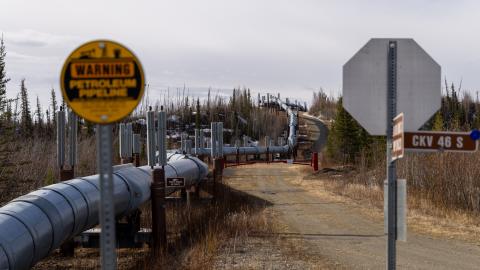
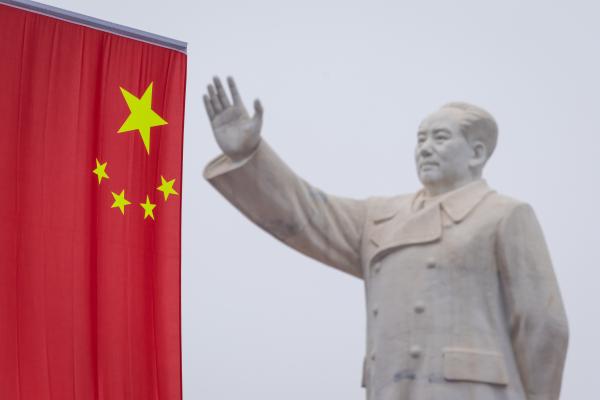
Join Dr. Miles Yu, senior fellow and director of Hudson’s China Center, for a conversation with Professor Xu on why misunderstanding China’s political order may create critical strategic risks for the US amid intensifying geopolitical rivalry.
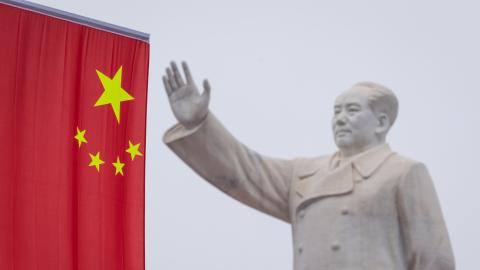
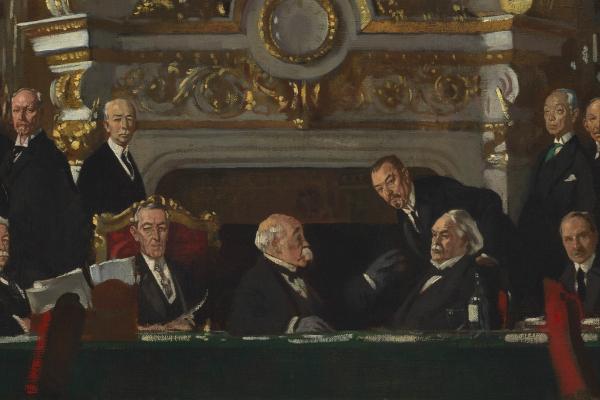
Join Hudson’s Peter Rough for a discussion with Wess Mitchell on the future of great power diplomacy.
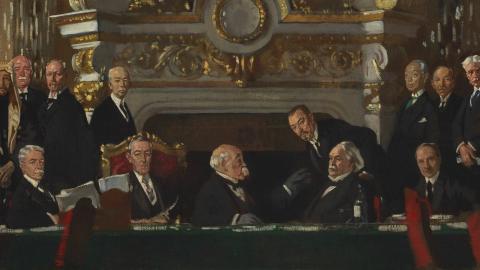
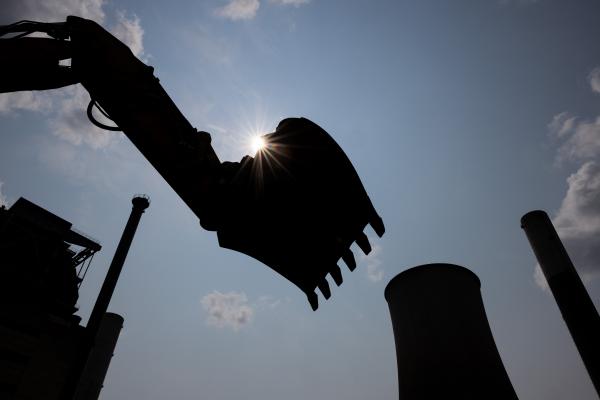
Join Hudson Institute for a conference on the future of America’s industrial base.
